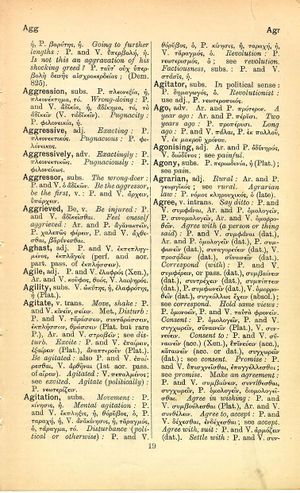agree
Ἀναξαγόρας δύο ἔλεγε διδασκαλίας εἶναι θανάτου, τόν τε πρὸ τοῦ γενέσθαι χρόνον καὶ τὸν ὕπνον → Anaxagoras used to say that we have two teachers for death: the time before we were born and sleep | Anaxagoras said that there are two rehearsals for death: the time before being born and sleep
English > Greek (Woodhouse)
v. intrans.
say ditto: P. and V. συμφαναι, Ar. and P. ὁμολογεῖν, P. συνομολογεῖν, Ar. and V. ὁμορροθεῖν.
agree with (a person or thing said): P. and V. συμφάναι (dat.), Ar. and P. ὁμολογεῖν (dat.), P. συμφωνεῖν (dat.), συναγορεύειν (dat.), V. προσᾴδειν (dat.), συναινεῖν (dat.).
correspond (with): P. and V. συμφέρειν, or pass. (dat.), συμβαίνειν (dat.), συντρέχειν (dat.), συμπίπτειν (dat.), P. συμφωνεῖν (dat.), V. ὁμορροθεῖν (dat.), συγκόλλως ἔχειν (absol.); see correspond.
hold same views: P. ὁμονοεῖν, P. and V. ταὐτὰ φρονεῖν.
consent: P. ὁμολογεῖν, P. and V. συγχωρεῖν, συναινεῖν (Plat.), V. συννεύειν.
consent to: P. and V. συναινεῖν (acc.) (Xen.), ἐπινεύειν (acc.), καταινεῖν (acc. or dat.), συγχωρεῖν (dat.); see consent.
promise: P. and V. ὑπισχνεῖσθαι, ἐπαγγέλλεσθαι; see promise.
make an agreement: P. and V. συμβαίνειν, συντίθεσθαι, συγχωρεῖν, P. ὁμολογεῖν, διομολογεῖσθαι.
agree in wishing: P. and V. συμβούλεσθαι (Plat.), Ar. and V. συνθέλειν.
agree to, accept: P. and V. δέχεσθαι, ἐνδέχεσθαι; see accept.
agree with, suit: P. and V. ἁρμόζειν (dat.).
settle with: P. and V. συντίθεσθαι (dat.), συμβαίνειν (dat.); see covenant.

